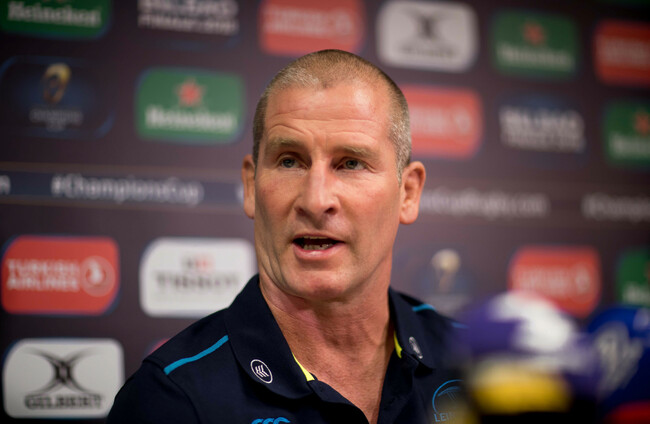EVEN AS HE rehabilitates his coaching career and reputation on this redemption mission at Leinster, the long shadows of Stuart Lancaster’s difficult past continue to hang over him.
The fallout from England’s ruinous home World Cup was never going to be pretty, and for Lancaster, who has previously spoken about the distress it has already caused, the blame game and the pillorying has reared its ugly head again.
Whether Rob Andrew’s scathing and damning appraisal of the ex-England coach’s role in the hosts’ spectacular failings in 2015 are warranted or not, shovelling the blame entirely on Lancaster — a former colleague, and the man he hired — by way of character assassination two years on is objectionable.
Clearly upset and disappointed by the comments from the RFU’s former director of rugby, Lancaster was given the choice of deferring yesterday’s media duties to another member of Leinster’s coaching staff but wanted to front up as planned.
“Everybody’s entitled to an opinion, Rob has given his and that’s his right I guess,” Lancaster began.
“You learn a lot about about yourself as a national team coach and you learn a lot about other people as well. We’ll leave it at that.”
Although, he didn’t.
Lancaster was visibly irked by Andrew’s decision to air his grievances so publicly but has enough integrity to restrain from firing shots in return, even if he only discovered the book was being published when The Telegraph carried the extract in its pages on Monday.
“I have to say I didn’t see this coming, I wasn’t aware that anything was being written,” he said.
“But I guess it’s part and parcel of being a national coach, you know, when you take the responsibility you’re accountable when it doesn’t go well. I think I did that from the start and I will still continue to do that.”
Indeed, Lancaster has been open and honest about those four years in charge of England and particularly the six months following the World Cup, during which he thought about ‘the nightmare’ everyday.
Of course, Andrew’s claims, such as Lancaster ‘lost the plot’ during the build-up to the tournament, and that he became ‘dictatorial’ in his final year in charge, could carry stock but to himself relinquish all responsibility for the systematic failures appears to be a blame-passing exercise.
“It’s not for me to comment on whether it’s the wrong thing to do. I was certainly unaware it was coming up, but people are motivated in different ways,” Lancaster adds, diplomatically.
In his robust assessment of the tournament, Andrew said Lancaster oversaw ‘a car crash in slow motion’ and the fast-tracking of Sam Burgess, who subsequently became the scapegoat for all that went wrong, was part of a scrambled decision-making process.
Lancaster has since conceded he would not have selected Burgess if he knew the centre was going to return to rugby league once the tournament was over, but when asked about that particular criticism yesterday he once again sidestepped the issue.
“I’m not going to go there, I’ve got my thoughts and I’ll keep them to myself for the time being,” he replied.
“What I want to try and do is pass on what I’ve learnt as a coach to other coaches, to teachers, to people in leadership positions and also more importantly to people in Ireland and to Leinster. I don’t think it will do anyone any good by going back all over that now.”
Without question, Lancaster’s tenure ended in embarrassment and ignominy as England crashed out of their own World Cup at the group stages. There were clearly mistakes made in planning and selection and he was responsible for that, but the preceding three years were far from a disaster; Lancaster’s final win percentage was 61%, with only Geoff Cooke, Jack Rowell and Sir Clive Woodward bettering that.
In the two years since, Lancaster has used the torment and mental scars to go away and broaden his coaching experience — to lose, but learn — by immersing himself in different rugby environments while picking the brains of other coaches, including Vern Cotter, the Montpellier head coach who will be in the opposite box at the RDS on Saturday.
As turbulent and traumatic as the whole affair was for Lancaster and his family, the 48-year-old has since rebuilt his reputation at Leinster in his role as senior coach, overseeing an encouraging and progressive 13 months for the province; that in itself makes all this, and the timing of Andrew’s book release, all the more wounding.
But his impact at Leinster cannot be understated and the players often name check Lancaster in their praise for his work since arriving to assist Leo Cullen at the start of last season. The best piece of business Mick Dawson did was bringing him to Dublin and then being able to keep hold of him for another two years.
“I think coaching England, I coached over 50 international games which I think puts me second most or around there — Sir Clive Woodward has obviously got the most experience,” Lancaster continued.
“So, it does give you a lot of experience. You go through good times, you have great wins and great moments. You go through tough times as well, you learn a lot about yourself and other people as well.
“The down-time in between coaching England and coming to Leinster allowed me to go and visit other environments, to visit other international coaches who have been through the sort of experiences that I’ve been through and learnt from them.
“You package all of that together and you bring it to Leinster. So I probably underestimated the development that I went through, not just coaching England but all of those years preceding that as well. I was involved at all levels of the game from being a teacher, right through to being a national coach.”
Lancaster is pragmatic in his outlook and has certainly endeared himself to rugby fans on this island during his time here, not least because he has now erased any doubt over his credentials as a coach with a very modern mindset.
The former school teacher is also one of rugby’s nice guys. When he talks, the room listens and when he speaks, it’s with conviction, clarity and wisdom. A lot of coaches could learn a thing or two from him.
Yet he insists, even when his repute as a coach is questioned by withering assessments such as the one offered by Andrew, there is no extra motivation to prove himself to anyone.
“That’s every coaches’ aim [to win trophies],” he explains. “Every coaches’ aim is to deliver trophies to the team and my aim is not motivated by proving people wrong or trying to change people’s perceptions.
“It’s trying to do the right thing on a daily basis, trying to do the right thing for Leinster, trying to improve the players, to improve the environment. As coaches, we have a lot of control but we don’t have the ultimate control as to whether you win.
“You want to empower your players to take responsibility for that and that’s what I’m trying to do at Leinster. I don’t think my motivation is any different to any other coach.
“If you spoke to Vern Cotter, what’s his motivation? He left Scotland in a very positive light, but he’ll be massively motivated to win the European Cup for Montpellier as I am for Leinster.”
Subscribe to The42 podcasts here:














He’s not as disappointed as some on relation to how far off they are? They are miles off. No offence to Munster but they are an average,though very gutsy and committed side,and they have hammers Leinster twice in a row now. I do agree that they haven’t had any continuity with combinations,especially from 9-13,and hopefully when the likes of OBrien, Healy, Moore, Teo, McFadden etc come back then there will be a big improvement.
I must take the opportunity to praise Matt O’Connor for the huge improvement in Guinness Pro12 teams. Ever since he arrived at Leinster, every other team has greatly improved. Teams, that two years ago were almost brushed aside by Leinster, have now reached the heights that Leinster once inhabited alone.
Treviso have improved, Munster have improved, Edinburgh have improved, Scarlets have improved, Dragons have improved, Zebra have improved, Connacht (brilliant tonight, by the way) have improved..
In fact, they have all improved so much that Leinster has great difficulty taking on any of them.
By extension, Wasps and Harlequins have shown just how brilliant they are too due to you Matt.
I can hardly wait to see how much Castres get better when they arrive at the RDS soon. They will build statues in your image all over the town.
Matt, you have done European rugby a great service. They have all reached and surpassed Leinster this season thanks to your input at Leinster and everywhere else.
Thank you Matt and Happy New year!.
(and also to Mr Caputo, the news paper seller. Your influence on all other teams has been exceptional)